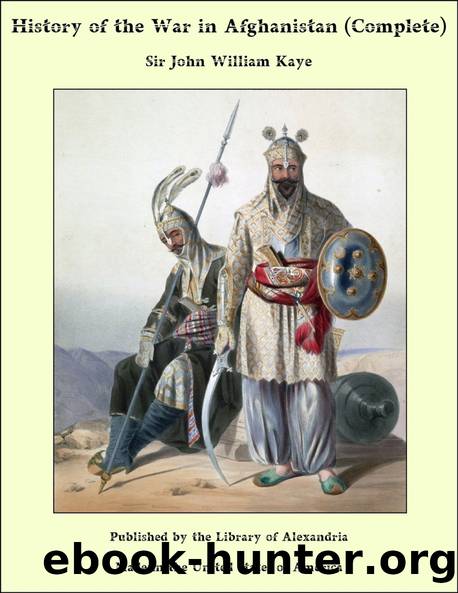History of the War in Afghanistan, Vol. 2 (of 3) by Kaye John William Sir

Author:Kaye, John William, Sir [Kaye, John William, Sir]
Language: eng
Format: epub
ISBN: 9781354704912
Barnesnoble:
Publisher: Bibliolife DBA of Bibilio Bazaar II LLC
Published: 2016-04-28T00:00:00+00:00
On the same day, Captain Johnson impressed upon the Envoy that there was no time to be lostâthat if a retreat on Jellalabad were to be determined upon, it should be determined upon at once, as it would be necessary to take provisions for five days with the retreating force. The Envoy assented to this; but, ever eager to clutch at any hope, however slender, of deferring the dreadful day of surrender, he added, âLet us wait two days longerâsomething may turn up.â
The two days passed, and nothing turned up. So the military authorities continued to press upon the Envoy, with oft-repeated urgent recommendations, for a speedy conclusion of a treaty with the enemy, enabling the British troops in safety to evacuate the country. But still the Envoy clung to the hope that something might be evolved in our favour; and delayed, in spite of their importunities from day to day, the dreadful hour of surrender. The General knew that his troops were not to be trusted. The Envoy knew this equally well; but, more jealous of the honour of his country, more hopeful and more courageous, he was unwilling to fling away a single chance which the wheel of time might throw up in his favour. In that great chapter of accidents, however, to which he so bravely turned, were written down only further disasters and degradations. On the 5th of December, the enemy, in open day, burnt the bridge which the English had thrown over the Caubul River, a quarter a mile from the cantonments. On the day after the calamitous action of the 23rd of November, the insurgents had begun to destroy it, and now they completed the work of destruction. They burnt it exultingly before the faces of our troops, who were lining the ramparts and looking idly on, as though there were no dishonour in endurance. The bridge was of little use at that season of the year, for the stream was fordableâbut it was a burning disgrace to the military authorities, that with 5000 British troops at their command, and with the ramparts of the cantonments bristling with guns, they should have suffered such an insult as this to be flung in their face.
The following day was one also of humiliation. Mahomed Sheriffâs fort, which was garrisoned by a party of European and Native troops, was abandoned on the 6th of December. The enemy, a day or two before, had endeavoured to blow open the gate with powder-bags, but had not succeeded in the attempt. They might have spared themselves the trouble of the effort and the discredit of the failure. On the 6th of December, a very small party of the enemy, unperceived by the garrison, contrived to climb up the walls of the fort, from the direction of the Kingâs garden. They had no sooner shown their heads at the window of the room where our men were sitting, than both Europeans and natives, panic-struck and bewildered, escaped over the opposite wall, and, abandoning their bedding, arms, and ammunition, fled into the cantonments.
Download
This site does not store any files on its server. We only index and link to content provided by other sites. Please contact the content providers to delete copyright contents if any and email us, we'll remove relevant links or contents immediately.
Machine Learning at Scale with H2O by Gregory Keys | David Whiting(4295)
Never by Ken Follett(3937)
Fairy Tale by Stephen King(3370)
Will by Will Smith(2911)
Fantastic Beasts and Where to Find Them: The Original Screenplay by J. K. Rowling(2510)
It Starts With Us (It Ends with Us #2) by Colleen Hoover(2345)
Can't Hurt Me: Master Your Mind and Defy the Odds - Clean Edition by David Goggins(2324)
The Storyteller by Dave Grohl(2229)
Friends, Lovers, and the Big Terrible Thing by Matthew Perry(2219)
The Becoming by Nora Roberts(2189)
Cloud Cuckoo Land by Anthony Doerr(2102)
New Morning Mercies: A Daily Gospel Devotional by Paul David Tripp(1917)
A Short History of War by Jeremy Black(1842)
HBR's 10 Must Reads 2022 by Harvard Business Review(1840)
The Complete Witcher by Andrzej Sapkowski(1835)
Cytonic by Brandon Sanderson(1831)
Go Tell the Bees That I Am Gone by Diana Gabaldon(1754)
Leviathan Falls (The Expanse Book 9) by James S. A. Corey(1727)
A Game of Thrones (The Illustrated Edition) by George R. R. Martin(1722)
